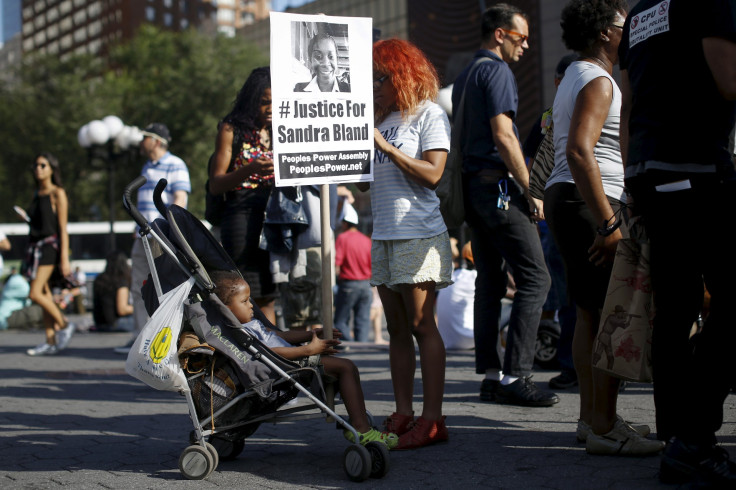Sandra Bland Suicide Death: African-American Women Tend To Suffer Depression In Silence

Last March, Sandra Bland announced to the virtual world that she was depressed. She posted a video on her Facebook page, admitting her turbulent mental health and the emotional struggle she was going through. After being arrested in Waller County, Texas, last week, she said she had attempted suicide last year. Despite this, her friends and family insisted they had no notion she was depressed or had attempted suicide, and were in disbelief when her death in a Waller County jail was announced as a suicide on Thursday.
While Bland is an anomaly -- African-American suicides make up one of the smallest percentages of suicides in the general population -- her hidden struggle with depression is not uncommon for African-American women. Black women suffering from depression and suicidal thoughts face a unique set of barriers, and often suffer in silence.
Researchers found that women who have experienced race and gender-based discrimination are more at risk for suicide, Psych Central reported. This backs up a previous study that found a correlation between low socioeconomic status and poor mental health.
In the study “Too Much of a Good Thing? Psychosocial Resources, Gendered Racism, and Suicidal Ideation Among Low Socioeconomic Status African-American Women,” published in Social Psychology Quarterly in 2012, researchers found a correlation between race and gender-based discrimination and suicidal ideation, which means thinking about and desiring to commit suicide.
The study also found that having a purpose in life, self-esteem and active coping, which are all psychological resources that have been found to be protective of mental health among white Americans, can also buffer the effects that gender and racial discrimination have on suicidal ideations among low socioeconomic status among African-American women.
Statistically speaking, African American women don't commit suicide. Lowest rate in US #WhatHappenedToSandraBland pic.twitter.com/Yq7OH6zy38
— Pamela Mays McDonald (@pammaysmcdonald) July 22, 2015“There are specific historical and cultural circumstances and lived experiences that are unique to each racial and gender group, and these differentially shape factors that increase or decrease vulnerability and resilience,” said Dr. Brea L. Perry, a co-author of the study, Psych Central reported.
There were 41,149 suicides reported in the U.S. in 2013, according to the Centers for Disease Control and Prevention, making it the 10th leading cause of death for Americans. Men accounted for 77.9 percent of suicides in 2013. The rate of white suicides was the highest, at 14.2 percent. The second-highest rate was among American Indians and Alaska Natives, with 11.7 percent. Asian and Pacific Islanders came next with 5.8 percent, Hispanics had a rate of 5.4 percent and blacks had the lowest with 5.4 percent.
African-Americans who do suffer from depression often do so secretly. The Grady Nia Project, a long-running series of studies with African-American women who have a history of domestic violence and suicidality, found that cultural norms influence women’s responses to intimate partner violence and suicidality, and African-American women are less likely to seek help from institutions that they feel have contributed to their oppression in the past.
Black women make up the group most undertreated for depression in the nation, the Huffington Post reported in 2014. A study published by the CDC found that women and African-Americans are more likely to report depression, but only 7.6 percent of African-Americans sought treatment in comparison to 13.6 percent of the general population in 2011.
There are many barriers for black women in finding treatment for depression. Over 20 percent of African-Americans are uninsured, compared to less than 12 percent of whites. Researchers at Mental Health America found that 56 percent of blacks believed that depression was a natural part of aging.
Researchers at the National Alliance for Mental Illness have found that African-American women often reference emotions related to depression as “evil” or “acting out,” the Huffington Post reported. The researchers said that these tendencies to deny negative emotions originated with slavery, and that avoiding emotions was a survival technique and has now become a cultural pattern for the African-American community. There also is a stereotype of the strong, black woman that causes many African-American women to avoid seeking help from mental health services.
"Through the ideal of the strong black woman, African-American women are subject not only to historically rooted racist and sexist characterizations of black women as a group but also a matrix of unrealistic interracial expectations that construct black women as unshakeable, unassailable and naturally strong,” said Melissa Harris-Perry in her book "Sister Citizen: Shame, Stereotypes and Black Women in America.”
© Copyright IBTimes 2024. All rights reserved.












